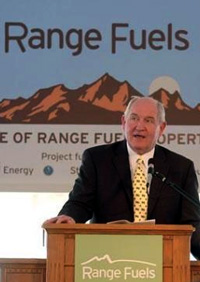 Presidential candidates Sens. Hillary Clinton (D-New York) and John McCain (R-Arizona) made separate stops at two Renewable Energy Group biodiesel facilities during their campaigns in Iowa today.
Presidential candidates Sens. Hillary Clinton (D-New York) and John McCain (R-Arizona) made separate stops at two Renewable Energy Group biodiesel facilities during their campaigns in Iowa today.
 Clinton toured the 30-million gallon REG network biodiesel production facility in Newton, while McCain attended the ribbon-cutting of the new REG headquarters in Ames. The fact that two national candidates are pushing biodiesel is a welcome sight to the National Biodiesel Board:
Clinton toured the 30-million gallon REG network biodiesel production facility in Newton, while McCain attended the ribbon-cutting of the new REG headquarters in Ames. The fact that two national candidates are pushing biodiesel is a welcome sight to the National Biodiesel Board:
“These two visits in the same day exemplify the bipartisan recognition of biodiesel’s many benefits, ranging from economic development to energy security to climate change,” said Darryl Brinkmann, who serves as Chairman of the National Biodiesel Board (NBB) and spoke at the event. “The NBB applauds efforts to increase public awareness of the many benefits associated with expanded biodiesel production and use.”
Keep in mind, though, that neither one has been a great advocate of biofuels when it really counted: during their votes in the U.S. Senate. Back on June 5th, I told you about McCain’s flip-flopping ways when it comes to alternative energy with this from a UPI article:
During the 2000 presidential campaign, Sen. John McCain, R-Ariz., skipped the Iowa caucuses, perhaps sensing that, among other things, his opposition to ethanol subsidies would not go over well in a corn-growing state like Iowa.
Seven years later, he is crisscrossing the country again to win support for his bid to become the Republican presidential nominee, and this time his route includes stops in Iowa.
The article points out that in a speech in Virginia in April McCain said that while he would encourage the growth of ethanol infrastructure, he still won’t sign off on government subsidies.
Clinton is a bit of a fair-weathered friend of biofuels as well, as I pointed out in a July 24th post from this Newsday article:
At one time, Clinton stood squarely with ethanol’s opponents, and voted several times against ethanol bills.
When the Senate last took up ethanol-related legislation in 2005, the former first lady unsuccessfully opposed requiring refiners to boost their use of renewable fuels and the 51-cent tax credit.
Previously, she had warned that requiring added ethanol would bring higher gasoline prices and environmental risks.
“We are providing a single industry with a guaranteed market for its products — subsidies on top of subsidies on top of subsidies and, on top of that, protection from liability,” she said during an April 2002 Senate energy bill debate. “What a sweetheart deal.”
So let’s see where both these candidates REALLY stand when the Iowa Caucuses are over.


 Georgia Governor Sonny Perdue welcomed a new phase in ethanol production to his state with
Georgia Governor Sonny Perdue welcomed a new phase in ethanol production to his state with  5. Micro Wind Turbine
5. Micro Wind Turbine
 Presidential candidates Sens. Hillary Clinton (D-New York) and John McCain (R-Arizona) made separate stops at two Renewable Energy Group biodiesel facilities during their campaigns in Iowa today.
Presidential candidates Sens. Hillary Clinton (D-New York) and John McCain (R-Arizona) made separate stops at two Renewable Energy Group biodiesel facilities during their campaigns in Iowa today. Clinton toured the 30-million gallon REG network biodiesel production facility in Newton, while McCain attended the ribbon-cutting of the new REG headquarters in Ames. The fact that two national candidates are pushing biodiesel is a welcome sight to the National Biodiesel Board:
Clinton toured the 30-million gallon REG network biodiesel production facility in Newton, while McCain attended the ribbon-cutting of the new REG headquarters in Ames. The fact that two national candidates are pushing biodiesel is a welcome sight to the National Biodiesel Board: DuPont and BP are working to bring a next generation biofuel to market on a commercial scale and officials are optimistic that it might get there before cellulosic ethanol.
DuPont and BP are working to bring a next generation biofuel to market on a commercial scale and officials are optimistic that it might get there before cellulosic ethanol. In an
In an  The 20th annual
The 20th annual  Massachusetts lawmakers will consider a proposal designed to increase that state’s use of biofuels. State Senate President Therese Murray and House Speaker Sal DiMasi, working with Governor Deval Patrick, filed a bill today that sets usage standards and creates a state Biofuels Task Force, responsible for addressing issues, such as energy crop incentives, tax credits for advanced biofuels research and development, fuel performance standards, and requirements to produce flex-fuel vehicles.
Massachusetts lawmakers will consider a proposal designed to increase that state’s use of biofuels. State Senate President Therese Murray and House Speaker Sal DiMasi, working with Governor Deval Patrick, filed a bill today that sets usage standards and creates a state Biofuels Task Force, responsible for addressing issues, such as energy crop incentives, tax credits for advanced biofuels research and development, fuel performance standards, and requirements to produce flex-fuel vehicles. What started as a project to brew biodiesel in some old pots from the school cafeteria has turned into a 100,000-gallon-a-year production line that saves the school an estimated $125,000 a year in fuel costs.
What started as a project to brew biodiesel in some old pots from the school cafeteria has turned into a 100,000-gallon-a-year production line that saves the school an estimated $125,000 a year in fuel costs.